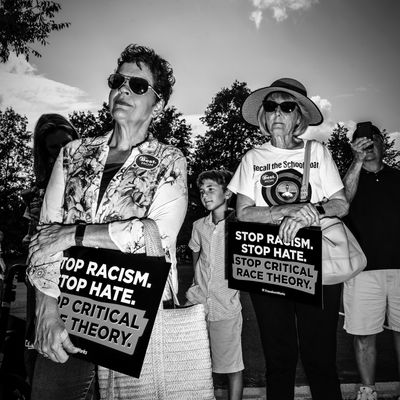
There is nothing like the right-wing’s long game. They manufacture crises with the regularity and efficiency of a Ford automobile plant. And the latest battleground in the ongoing cultural proxy war waged by the right continues to be critical race theory. It’s really a war about race, history, power, and institutions like our public schools, which are tasked with enforcing our cultural values. For months now, we’ve been treated to a media montage of politically stoked parental outrage at school board meetings across the country over the supposed infiltration of critical race theory into public education. And more than a dozen states have passed a series of local and state bans on the teaching of CRT or related concepts on race, racism, and American history.
Given all that hysteria, you’d be forgiven for not remembering that this particular line of attack is a decade old. When President Barack Obama was running for his second term in 2012, Andrew Breitbart’s infamous and eponymous disinformation machine released a video of Obama at a 1990 Harvard Law School rally, defending (and hugging) his former professor Derrick Bell, a.k.a. the father of critical race theory. Bell had come under fire for protesting Harvard Law’s refusal to tenure any women of color professors, and Obama’s presence in the video served as alleged evidence of his collusion with a radical left-wing racial agenda. Fear-mongering is of course the weapon of choice for conservatives waging culture wars — they wield it to distract from truth and logic, and do it so often it becomes a blur. Thing is, that blur works on liberals, too. As the left-wing rushes to course correct, they end up getting in their own way.
It’s been said before (so many times), but here we go again: There is no mass campaign on behalf of the political left in this country to infiltrate public schools and indoctrinate young people with the tenets of CRT. Critical race theory is not an indoctrination; it is an education — an inquiry, contestation, and clarification about the stakes and politics of knowledge.
In the 1995 book Critical Race Theory: The Key Writings That Formed the Movement, the editors argue that the first tenet of CRT is to “understand how a regime of white supremacy and its subordination of people of color have been created and maintained in America, and, in particular, to examine the relationship between that social structure and the professed ideals such as ‘the rule of law’ and ‘equal protection.’” Critical race theory, as Bell and his colleagues and students conceived it, is a highly specialized branch of legal study that attempts to make sense of how America’s entrenched relationship with racism affects American jurisprudence.
But when left-wing voices doggedly insist, in a push for accuracy, as I just did, that CRT isn’t being taught to children, we may be inadvertently conceding that doing so would be a bad thing. Children deserve to be taught real, factual history, and to have good analytic frameworks for understanding how racism impacts all our lives. CRT doesn’t need defending. If anything needs defending — not that it would work, of course, as this assault from the right is not being waged in good faith — it’s the continued teaching of American racial myths about Indigenous “savagery,” benevolent slavery, and the “war of Northern aggression.”
In fact, critical race theory is the sort of vital truth-telling that is necessary if American democracy is meant to survive the 21st century. Don’t think of it as a theoretical exercise — many conservative white people fear CRT precisely because it is not theoretical at all. As the Critical Race Theory editors argued, “Legal scholarship about race in America can never be written from a distance of detachment or with an attitude of objectivity,” because “racial power is exercised legally and ideologically.” Simply put, the law is not some neutral force for social good. Just look at the national tug-of-war over voting rights — it’s the clearest evidence around that the law is not always on the side of “equal protection.”
The 2013 ruling by the U.S. Supreme Court in Shelby v. Holder to strike down the preclearance protections in the Voting Rights Act, gutted the legislation of its enforcement mechanism and swung open the gates for the GOP to institute a slew of voter-suppression laws that have reached their apex in 2021. In July, the Roberts Court set voting rights back even further, when it issued a key ruling upholding two voting laws in Arizona that have a disproportionately negative impact on voters of color. The laws restrict where voters can cast their ballots and disallow anyone other than a relative or caregiver to collect absentee ballots.
As Justice Samuel Alito wrote in the Court’s opinion, “some disparity in impact does not mean a system is not equally open.” This kind of equivocation — about the disparate impact standard for judging the racial effects rather than racial intents in policy-making — dealt one more blow to a nation struggling to maintain some semblance of a democratic structure of governance. The editors of the Critical Race Theory volume point to this as one of the key ways that conservatives maintain white-supremacist power structures: It doesn’t matter if policies consistently have a negative impact on people of color, as long as no one explicitly states that this is the goal. CRT offers the counterargument that impact should matter more than intention, and as any of us who has ever been owed an apology knows, how something affects us absolutely matters more than what a person intended to do or not do.
Yale University professor Tavia Nyong’o argues in his book The Amalgamation Waltz: Race, Performance, and the Ruses of Memory, “race is a theory of history, so exposing its historicity will trouble its foundations.” Therein is the rub. Race is a historical fiction, a category invented by white people to explain and justify the racial hierarchies necessary for their geopolitics of imperialism and colonial expansion. Race was not, in the 17th century, a fact. It was merely a theory, an outrageous hypothesis, that white people were the only people in the history of time who had done anything significant, worth protecting, and worth spreading around the world. It was a theoretical supposition of how different groups of people from different geographic locations existed in relation to each other. And the colonizing class decided on a hierarchy, with those from Europe both at the top and in a position to dominate the others.
The most exasperating thing about the CRT debate is exactly this — race itself is the biggest theoretical hoax to ever exist, and by the sheer force of untold levels of violent devastation, Europe and America’s white forefathers marshaled it into history as a fact, which none of us have ever recovered from. There is no “getting beyond race” at this point. There are only the choices to grapple with and redress its harmful impacts ethically or to engage in the politics of denial. It’s clear which path the right has chosen.
Black people, on the other hand, have succeeded in transforming this nefarious imposition into a cultural legacy that is luminescent and otherworldly. In academia, CRT is part of the broader Black History and Black Studies project to institute a new politics of knowledge, a new way of understanding what is and has been, and a new set of possibilities for what can be. From our classrooms to our courts, we can win this debate, but only if we stop letting the other side tell us what CRT is.
Exposing the historicity of race and white supremacy demands a new theory of how we all might coexist on the planet. And that theory will not begin from the absurd notion that white people are superior or naturally dominant. Critical race theory and the truer histories to which it points, namely that the invented fictions of whiteness as supreme and superior are just that, are an existential threat to the Samuel Alitos of the world, because CRT topples the law as an American deity, reminding us that American jurisprudence is a flesh-and-blood enterprise, and thus is subject to hubris, ego, power, and self-interest, just like every other thing in our lives.





